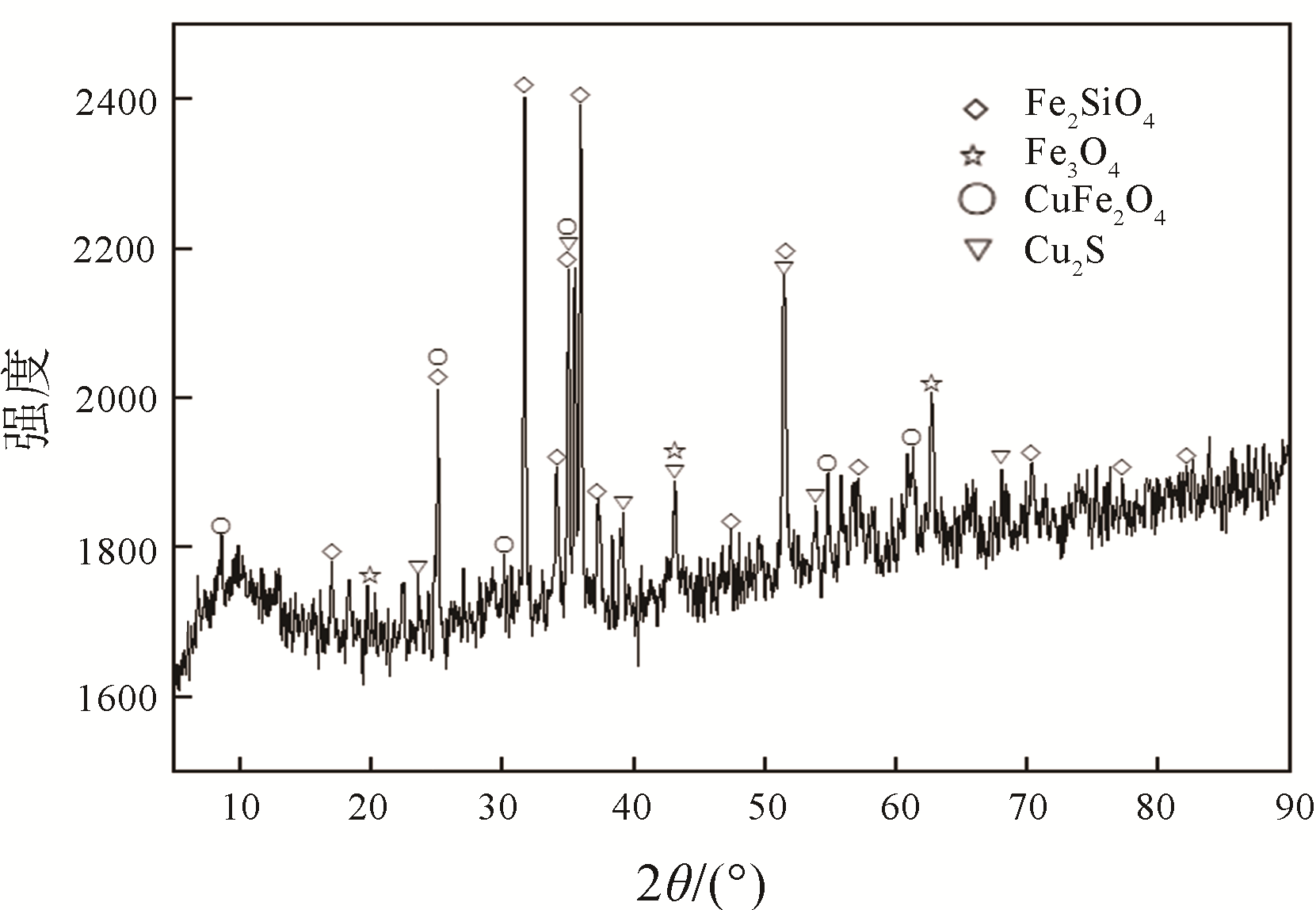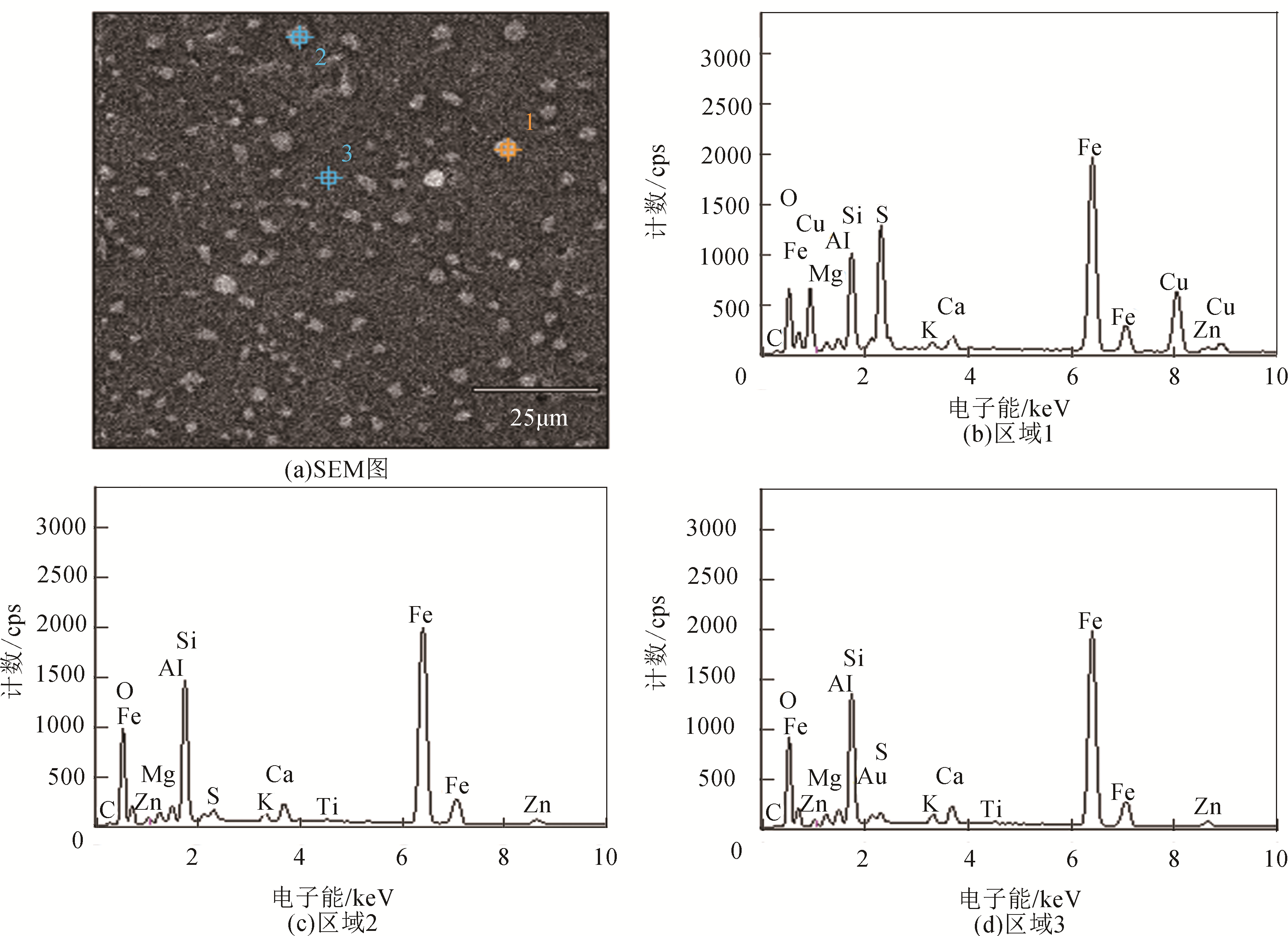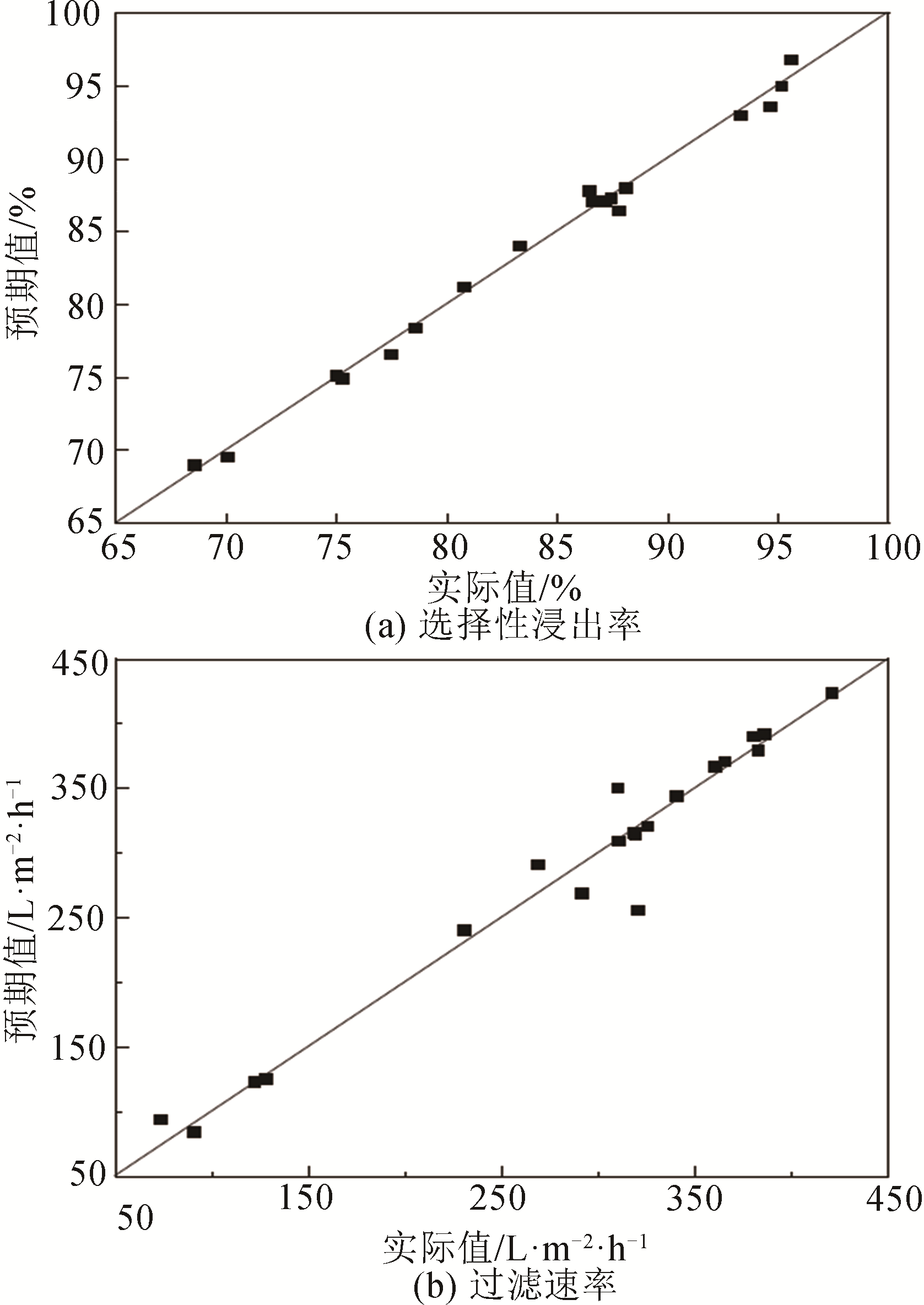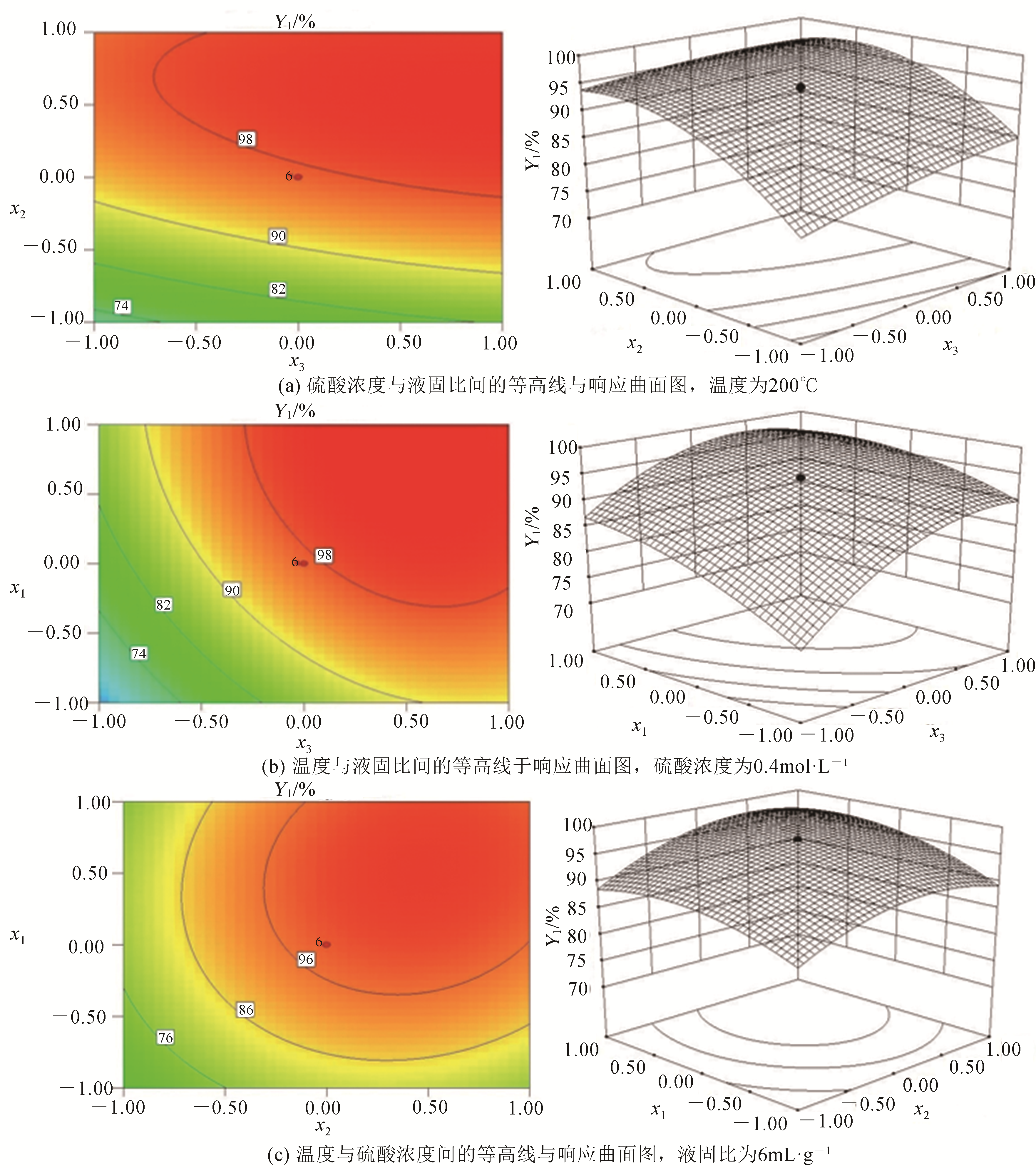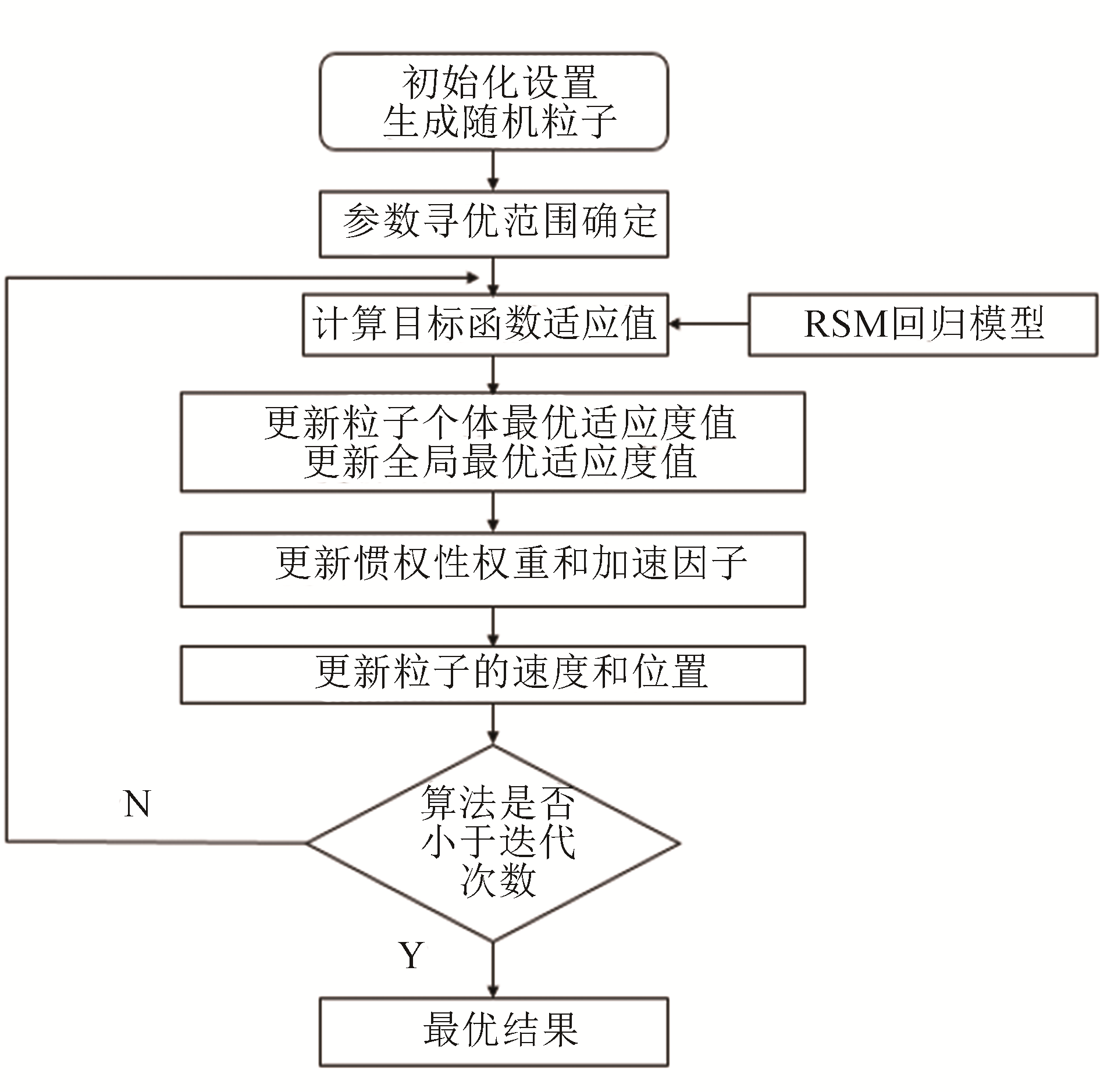Chemical Industry and Engineering Progress ›› 2020, Vol. 39 ›› Issue (S1): 270-280.DOI: 10.16085/j.issn.1000-6613.2019-1595
• Resources and environmental engineering • Previous Articles Next Articles
Multi-objective optimization of pressure oxidative selective leaching of copper smelting slag by response surface methodology
Gongchu SHI( ), Yalong LIAO(
), Yalong LIAO( ), Bowen SU, Yu ZHANG, Jiajun XI
), Bowen SU, Yu ZHANG, Jiajun XI
- Faculty of Metallurgical and Energy Engineering of Kunming University of Science and Technology, Kunming 650093, Yunnan, China
-
Received:2019-10-09Online:2020-06-29Published:2020-05-20 -
Contact:Yalong LIAO
响应曲面法多目标优化铜冶炼渣氧压选择性浸出工艺
- 昆明理工大学冶金与能源工程学院,云南 昆明 650093
-
通讯作者:廖亚龙 -
作者简介:史公初(1994—),男,硕士研究生,研究方向为资源二次回收利用。E-mail:961838703@qq.com 。 -
基金资助:国家自然科学基金(21978122)
CLC Number:
Cite this article
Gongchu SHI, Yalong LIAO, Bowen SU, Yu ZHANG, Jiajun XI. Multi-objective optimization of pressure oxidative selective leaching of copper smelting slag by response surface methodology[J]. Chemical Industry and Engineering Progress, 2020, 39(S1): 270-280.
史公初, 廖亚龙, 苏博文, 张宇, 郗家俊. 响应曲面法多目标优化铜冶炼渣氧压选择性浸出工艺[J]. 化工进展, 2020, 39(S1): 270-280.
share this article
Add to citation manager EndNote|Ris|BibTeX
URL: https://hgjz.cip.com.cn/EN/10.16085/j.issn.1000-6613.2019-1595
| 成分 | TFe | MgO | CaO | SiO2 | Αl2O3 | Cu | Zn | S |
|---|---|---|---|---|---|---|---|---|
| 质量分数/% | 41.36 | 2.51 | 2.54 | 30.50 | 4.24 | 0.64 | 1.94 | 0.98 |
| 成分 | TFe | MgO | CaO | SiO2 | Αl2O3 | Cu | Zn | S |
|---|---|---|---|---|---|---|---|---|
| 质量分数/% | 41.36 | 2.51 | 2.54 | 30.50 | 4.24 | 0.64 | 1.94 | 0.98 |
| 区域 | 参数 | O | Mg | Αl | Si | S | Ca | Fe | Cu | Zn |
|---|---|---|---|---|---|---|---|---|---|---|
| 1 | 质量分数 原子分数 | 19.13 38.34 | 1.32 1.74 | 1.54 1.83 | 10.65 12.16 | 10.03 10.03 | 1.26 1.01 | 33.95 19.49 | 17.98 9.07 | 1.74 0.85 |
| 2 | 质量分数 原子分数 | 28.72 50.18 | 1.74 2.01 | 1.57 2.22 | 16.47 16.39 | 0.75 0.65 | 1.79 1.25 | 43.45 21.75 | — — | 2.27 0.97 |
| 3 | 质量分数 原子分数 | 27.76 49.80 | 2.06 2.44 | 2.30 2.44 | 16.02 16.37 | 1.14 1.02 | 1.73 12.4 | 42.93 22.06 | — — | 2.11 0.93 |
| 区域 | 参数 | O | Mg | Αl | Si | S | Ca | Fe | Cu | Zn |
|---|---|---|---|---|---|---|---|---|---|---|
| 1 | 质量分数 原子分数 | 19.13 38.34 | 1.32 1.74 | 1.54 1.83 | 10.65 12.16 | 10.03 10.03 | 1.26 1.01 | 33.95 19.49 | 17.98 9.07 | 1.74 0.85 |
| 2 | 质量分数 原子分数 | 28.72 50.18 | 1.74 2.01 | 1.57 2.22 | 16.47 16.39 | 0.75 0.65 | 1.79 1.25 | 43.45 21.75 | — — | 2.27 0.97 |
| 3 | 质量分数 原子分数 | 27.76 49.80 | 2.06 2.44 | 2.30 2.44 | 16.02 16.37 | 1.14 1.02 | 1.73 12.4 | 42.93 22.06 | — — | 2.11 0.93 |
| 因素 | 编码 | 单位 | 水平 | 梯步值 | ||||
|---|---|---|---|---|---|---|---|---|
| -1.682(-α) | -1 | 0 | +1 | +1.682(+α) | ||||
| 温度 | x1 | °C | 183 | 190 | 200 | 210 | 217 | 15 |
| 硫酸浓度 | x2 | mol·L-1 | 0.23 | 0.3 | 0.4 | 0.5 | 0.57 | 0.1 |
| 液固比 | x3 | mL·g-1 | 4.3 | 5 | 6 | 7 | 7.7 | 1 |
| 因素 | 编码 | 单位 | 水平 | 梯步值 | ||||
|---|---|---|---|---|---|---|---|---|
| -1.682(-α) | -1 | 0 | +1 | +1.682(+α) | ||||
| 温度 | x1 | °C | 183 | 190 | 200 | 210 | 217 | 15 |
| 硫酸浓度 | x2 | mol·L-1 | 0.23 | 0.3 | 0.4 | 0.5 | 0.57 | 0.1 |
| 液固比 | x3 | mL·g-1 | 4.3 | 5 | 6 | 7 | 7.7 | 1 |
| 编号 | 编码 | 浸出率/% | 选择性浸出率Y1/% | 过滤速率Y2/L·m-2·h-1 | ||||
|---|---|---|---|---|---|---|---|---|
| x1 | x2 | x3 | Cu | Fe | Si | |||
| 1 | 0 | α | 0 | 97.49 | 1.97 | 1.41 | 94.11 | 374.64 |
| 2 | -1 | 1 | 1 | 96.86 | 1.59 | 1.05 | 94.22 | 356.59 |
| 3 | 0 | 0 | 0 | 97.39 | 1.23 | 1.32 | 94.84 | 391.20 |
| 4 | 0 | 0 | 0 | 97.63 | 1.07 | 1.72 | 94.84 | 388.85 |
| 5 | 1 | 1 | 1 | 98.32 | 1.68 | 0.81 | 95.83 | 403.25 |
| 6 | 0 | 0 | 0 | 97.63 | 1.03 | 1.80 | 94.80 | 395.14 |
| 7 | 0 | 0 | 0 | 97.63 | 1.13 | 1.73 | 94.77 | 392.11 |
| 8 | -α | 0 | 0 | 95.09 | 0.87 | 1.23 | 92.99 | 316.27 |
| 9 | α | 0 | 0 | 98.12 | 0.92 | 1.63 | 95.57 | 370.03 |
| 10 | 1 | -1 | 1 | 95.81 | 0.53 | 1.52 | 93.76 | 349.44 |
| 11 | 0 | 0 | -α | 93.28 | 1.09 | 2.46 | 89.73 | 268.61 |
| 12 | -1 | 1 | -1 | 96.79 | 2.31 | 2.45 | 92.03 | 296.88 |
| 13 | 0 | 0 | 0 | 96.92 | 1.03 | 1.02 | 94.87 | 394.61 |
| 14 | -1 | -1 | 1 | 94.15 | 1.28 | 2.87 | 90.00 | 316.13 |
| 15 | 1 | -1 | -1 | 90.80 | 2.71 | 1.13 | 86.96 | 302.45 |
| 16 | -1 | -1 | -1 | 88.17 | 1.19 | 1.76 | 85.22 | 297.84 |
| 17 | 0 | 0 | 0 | 98.08 | 1.13 | 2.12 | 94.83 | 393.65 |
| 18 | 1 | 1 | -1 | 94.94 | 1.22 | 1.51 | 92.21 | 320.40 |
| 19 | 0 | 0 | α | 97.54 | 1.26 | 1.33 | 94.95 | 379.97 |
| 20 | 0 | -α | 0 | 86.99 | 0.42 | 2.04 | 84.53 | 335.28 |
| 编号 | 编码 | 浸出率/% | 选择性浸出率Y1/% | 过滤速率Y2/L·m-2·h-1 | ||||
|---|---|---|---|---|---|---|---|---|
| x1 | x2 | x3 | Cu | Fe | Si | |||
| 1 | 0 | α | 0 | 97.49 | 1.97 | 1.41 | 94.11 | 374.64 |
| 2 | -1 | 1 | 1 | 96.86 | 1.59 | 1.05 | 94.22 | 356.59 |
| 3 | 0 | 0 | 0 | 97.39 | 1.23 | 1.32 | 94.84 | 391.20 |
| 4 | 0 | 0 | 0 | 97.63 | 1.07 | 1.72 | 94.84 | 388.85 |
| 5 | 1 | 1 | 1 | 98.32 | 1.68 | 0.81 | 95.83 | 403.25 |
| 6 | 0 | 0 | 0 | 97.63 | 1.03 | 1.80 | 94.80 | 395.14 |
| 7 | 0 | 0 | 0 | 97.63 | 1.13 | 1.73 | 94.77 | 392.11 |
| 8 | -α | 0 | 0 | 95.09 | 0.87 | 1.23 | 92.99 | 316.27 |
| 9 | α | 0 | 0 | 98.12 | 0.92 | 1.63 | 95.57 | 370.03 |
| 10 | 1 | -1 | 1 | 95.81 | 0.53 | 1.52 | 93.76 | 349.44 |
| 11 | 0 | 0 | -α | 93.28 | 1.09 | 2.46 | 89.73 | 268.61 |
| 12 | -1 | 1 | -1 | 96.79 | 2.31 | 2.45 | 92.03 | 296.88 |
| 13 | 0 | 0 | 0 | 96.92 | 1.03 | 1.02 | 94.87 | 394.61 |
| 14 | -1 | -1 | 1 | 94.15 | 1.28 | 2.87 | 90.00 | 316.13 |
| 15 | 1 | -1 | -1 | 90.80 | 2.71 | 1.13 | 86.96 | 302.45 |
| 16 | -1 | -1 | -1 | 88.17 | 1.19 | 1.76 | 85.22 | 297.84 |
| 17 | 0 | 0 | 0 | 98.08 | 1.13 | 2.12 | 94.83 | 393.65 |
| 18 | 1 | 1 | -1 | 94.94 | 1.22 | 1.51 | 92.21 | 320.40 |
| 19 | 0 | 0 | α | 97.54 | 1.26 | 1.33 | 94.95 | 379.97 |
| 20 | 0 | -α | 0 | 86.99 | 0.42 | 2.04 | 84.53 | 335.28 |
| 方差来源 | 平方和 | 自由度 | 均方 | F值 | p值 | 显著水平 |
|---|---|---|---|---|---|---|
| 模型 | 224.22 | 9 | 24.91 | 75.26 | < 0.0001 | 显著 |
| x1 | 9.90 | 1 | 9.90 | 29.91 | 0.0003 | |
| x2 | 86.96 | 1 | 86.96 | 262.71 | < 0.0001 | |
| x3 | 50.14 | 1 | 50.14 | 151.49 | < 0.0001 | |
| x1x2 | 1.72 | 1 | 1.72 | 5.20 | 0.0458 | |
| x1x3 | 1.49 | 1 | 1.49 | 4.49 | 0.0600 | |
| x2x3 | 4.16 | 1 | 4.16 | 12.57 | 0.0053 | |
| x12 | 1.31 | 1 | 1.31 | 3.97 | 0.0743 | |
| x22 | 60.89 | 1 | 60.89 | 183.96 | < 0.0001 | |
| x32 | 14.06 | 1 | 14.06 | 42.49 | < 0.0001 | |
| 残差 | 3.31 | 10 | 0.33 | |||
| 失拟项 | 3.31 | 5 | 0.66 | |||
| 纯误差 | 0.72 | 5 | 0.14 | |||
| 总合 | 227.53 | 19 | ||||
| R2 | 0.9855 | |||||
| Adj R2 | 0.9724 |
| 方差来源 | 平方和 | 自由度 | 均方 | F值 | p值 | 显著水平 |
|---|---|---|---|---|---|---|
| 模型 | 224.22 | 9 | 24.91 | 75.26 | < 0.0001 | 显著 |
| x1 | 9.90 | 1 | 9.90 | 29.91 | 0.0003 | |
| x2 | 86.96 | 1 | 86.96 | 262.71 | < 0.0001 | |
| x3 | 50.14 | 1 | 50.14 | 151.49 | < 0.0001 | |
| x1x2 | 1.72 | 1 | 1.72 | 5.20 | 0.0458 | |
| x1x3 | 1.49 | 1 | 1.49 | 4.49 | 0.0600 | |
| x2x3 | 4.16 | 1 | 4.16 | 12.57 | 0.0053 | |
| x12 | 1.31 | 1 | 1.31 | 3.97 | 0.0743 | |
| x22 | 60.89 | 1 | 60.89 | 183.96 | < 0.0001 | |
| x32 | 14.06 | 1 | 14.06 | 42.49 | < 0.0001 | |
| 残差 | 3.31 | 10 | 0.33 | |||
| 失拟项 | 3.31 | 5 | 0.66 | |||
| 纯误差 | 0.72 | 5 | 0.14 | |||
| 总合 | 227.53 | 19 | ||||
| R2 | 0.9855 | |||||
| Adj R2 | 0.9724 |
| 方差来源 | 平方和 | 自由度 | 均方 | F值 | p值 | 显著水平 |
|---|---|---|---|---|---|---|
| 模型 | 33004.45 | 9 | 3667.16 | 90.34 | < 0.0001 | 显著 |
| x1 | 2885.546 | 1 | 2885.55 | 71.08 | < 0.0001 | |
| x2 | 2305.832 | 1 | 2305.83 | 56.80 | < 0.0001 | |
| x3 | 11431.87 | 1 | 11431.87 | 281.62 | < 0.0001 | |
| x1x2 | 130.0885 | 1 | 130.09 | 3.20 | 0.1037 | |
| x1x3 | 335.9232 | 1 | 335.92 | 8.28 | 0.0165 | |
| x2x3 | 746.5248 | 1 | 746.52 | 18.39 | 0.0016 | |
| x12 | 5212.512 | 1 | 5212.51 | 128.41 | < 0.0001 | |
| x22 | 3174.955 | 1 | 3174.96 | 78.21 | < 0.0001 | |
| x32 | 9508.394 | 1 | 9508.39 | 234.23 | < 0.0001 | |
| 残差 | 405.9362 | 10 | 40.59 | |||
| 失拟项 | 378.0797 | 5 | 75.62 | |||
| 纯误差 | 27.85653 | 5 | 5.57 | |||
| 总合 | 33410.39 | 19 | ||||
| R2 | 0.9879 | |||||
| Adj R2 | 0.9769 |
| 方差来源 | 平方和 | 自由度 | 均方 | F值 | p值 | 显著水平 |
|---|---|---|---|---|---|---|
| 模型 | 33004.45 | 9 | 3667.16 | 90.34 | < 0.0001 | 显著 |
| x1 | 2885.546 | 1 | 2885.55 | 71.08 | < 0.0001 | |
| x2 | 2305.832 | 1 | 2305.83 | 56.80 | < 0.0001 | |
| x3 | 11431.87 | 1 | 11431.87 | 281.62 | < 0.0001 | |
| x1x2 | 130.0885 | 1 | 130.09 | 3.20 | 0.1037 | |
| x1x3 | 335.9232 | 1 | 335.92 | 8.28 | 0.0165 | |
| x2x3 | 746.5248 | 1 | 746.52 | 18.39 | 0.0016 | |
| x12 | 5212.512 | 1 | 5212.51 | 128.41 | < 0.0001 | |
| x22 | 3174.955 | 1 | 3174.96 | 78.21 | < 0.0001 | |
| x32 | 9508.394 | 1 | 9508.39 | 234.23 | < 0.0001 | |
| 残差 | 405.9362 | 10 | 40.59 | |||
| 失拟项 | 378.0797 | 5 | 75.62 | |||
| 纯误差 | 27.85653 | 5 | 5.57 | |||
| 总合 | 33410.39 | 19 | ||||
| R2 | 0.9879 | |||||
| Adj R2 | 0.9769 |
| 实验 | 浸出率/% | 选择性浸出率Y1/% | 过滤速率Y2/L·m-2?h-1 | ||
|---|---|---|---|---|---|
| Cu | Fe | Si | |||
| 1 | 97.94 | 0.34 | 0.81 | 96.79 | 398.17 |
| 2 | 98.32 | 0.42 | 1.51 | 96.39 | 394.49 |
| 3 | 98.18 | 0.41 | 1.24 | 96.53 | 401.38 |
| 平均值 | 98.08 | 0.39 | 1.12 | 96.57 | 398.01 |
| 实验 | 浸出率/% | 选择性浸出率Y1/% | 过滤速率Y2/L·m-2?h-1 | ||
|---|---|---|---|---|---|
| Cu | Fe | Si | |||
| 1 | 97.94 | 0.34 | 0.81 | 96.79 | 398.17 |
| 2 | 98.32 | 0.42 | 1.51 | 96.39 | 394.49 |
| 3 | 98.18 | 0.41 | 1.24 | 96.53 | 401.38 |
| 平均值 | 98.08 | 0.39 | 1.12 | 96.57 | 398.01 |
| 1 | 朱祖泽. 现代铜冶金学[M]. 北京: 科学出版社, 2003: 2-8. |
| ZHU Zuze. Modern copper metallurgy[M]. Beijing: Science Press, 2003: 2-8. | |
| 2 | 赵凯, 宫晓然, 李杰, 等. 急冷铜渣矿物学及其综合利用[J]. 中国矿业, 2015(9): 102-106. |
| ZHAO Kai, GONG Xiaoran, LI Jie, et al. Mineralogical characteristics and comprehensive utilization of rapid cooling copper slag[J]. China Mining Magazine, 2015(9): 102-106. | |
| 3 | ALTER H. The composition and environmental hazard of copper slags in the context of the Basel convention[J]. Resources Conservation and Recycling, 2005, 43(4): 353-360. |
| 4 | 廖亚龙, 叶朝, 王祎洋, 等. 铜冶炼渣资源化利用研究进展[J]. 化工进展, 2017, 36(8): 3066-3073. |
| LIAO Yalong, YE Chao, WANG Yiyang, et al. Resource utilization of copper smelter slag—A-state-of-the-arts review[J]. Chemical Industry and Engineering Progress, 2017, 36(8): 3066-3073. | |
| 5 | 王国红. 铜冶炼炉渣缓冷技术研究与生产实践[J]. 铜业工程, 2014(4): 27-30. |
| WANG Guohong. Copper smelting slag slow cooling technology research and practice[J]. Copper Engineering, 2014(4): 27-30. | |
| 6 | 张海鑫. 浅谈铜冶炼渣缓冷工艺[J]. 中国有色冶金, 2013, 42(3): 32-33. |
| ZHANG Haixin. Discussion on slow cooling process of copper smelting slag[J]. China Nonferrous Metallurgy, 2013, 42(3): 32-33. | |
| 7 | LI Y, PEREDERIY I, PAPANGELAKIS V G. Cleaning of waste smelter slags and recovery of valuable metals by pressure oxidative leaching[J]. Journal of Hazardous Materials, 2008, 152(2): 607-615. |
| 8 | 孙建军, 黄自力, 杨蘖, 等. 铜冶炼渣硫酸浸出回收铜试验研究[J]. 矿产综合利用, 2017(6): 102-107. |
| SUN Jianjun, HUANG Zili, YANG Nie, et al. Study on recovery of copper from copper smelting slag by sulfuric acid leaching[J]. Multipurpose Utilization of Mineral Resources, 2017(6): 102-107. | |
| 9 | 黄斐荣, 廖亚龙, 王祎洋, 等. 响应曲面法优化镍转炉渣氧压选择性浸出工艺[J]. 环境科学研究, 2016, 29(6): 894-899. |
| HUANG Feirong, LIAO Yalong, WANG Yiyang, et al. Optimization of pressure oxidative acid leaching of nickel converter slag by response surface methodology[J]. Research of Environmental Sciences, 2016, 29(6): 894-899. | |
| 10 | 廖亚龙, 黄斐荣, 周娟, 等. 低冰镍转炉渣中钴的氧压酸浸行为及其动力学[J]. 化工学报, 2015, 66(10): 3971-3978. |
| LIAO Yalong, HUANG Feirong, ZHOU Juan, et al. Kinetics and behavior of cobalt extraction from low nickel matte converter slag by pressure oxidative leaching with sulfuric acid[J]. CIESC Journal, 2015, 66(10): 3971-3978. | |
| 11 | MONTGOMERY D C. Design and analysis of experiments, 8th ed.[J]. Environmental Progress & Sustainable Energy, 2013, 32(1): 8-10. |
| 12 | 王安琪, 王永良, 叶礼平, 等. 响应曲面法优化氧化铜渣浮选提铜工艺[J]. 化工学报, 2018, 69(7): 3018-3028. |
| WANG Anqi, WANG Yongliang, YE Liping, et al. Optimization of recycling copper from copper oxide smelting slag by response surface methodology[J]. CIESC Journal, 2018, 69(7): 3018-3028. | |
| 13 | 曹磊, 廖亚龙, 史公初, 等. 锌置换渣加压酸性浸出过程铁的物相转化及其影响[J]. 中国有色金属学报, 2019, 29(2): 404-414. |
| CAO Lei, LIAO Yalong, SHI Gongchu, et al. Phase transformation of iron and its effect in pressure acid leaching process for zinc replacement residue[J]. The Chinese Journal of Nonferrous Metals, 2019, 29(2): 404-414. | |
| 14 | 赵艺文. 结合型罗布麻茶化学成分及其抗氧化活性研究[D]. 南京: 南京农业大学, 2017. |
| ZHAO Yiwen. Studies on bound chemical components and their antioxidant activity of Apocynum venetum tea [D]. Nanjing: Nanjing Agricultural University, 2017. | |
| 15 | VITANOV V I, JAVAID N, STEPHENSON D J. Application of response surface methodology for the optimization of micro friction surfacing process[J]. Surface & Coatings Technology, 2010, 204(21): 3501-3508. |
| 16 | DAS P K, ZHENG Y. Cumulative formation of response surface and its use in reliability analysis[J]. Probabilistic Engineering Mechanics, 2000, 15(4): 309-315. |
| 17 | 黄斐荣. 镍转炉渣氧压硫酸浸出提取钴、镍、铜的研究[D]. 昆明: 昆明理工大学, 2016. |
| HUANG Feirong. Extraction of cobalt, nickel and copper from nickel converter slag by oxygen pressure sulfuric acid leaching [D]. Kunming: Kunming University of Science and Technology, 2016. | |
| 18 | KEHOE S, ARDHAOUI M, STOKES J. Design of experiments study of hydroxyapatite synthesis for orthopedic application using fractional factorial design[J]. Journal of Material Engineering and Performance, 2011, 20(8): 1423-1437. |
| 19 | BARI M N, ALAM M Z, MUYIBI S A. Improvement of production of citric acid from oil palm empty fruit bunches: optimization of media by statistical experimental designs[J]. Bioresoure Technology, 2009, 100(12): 3115-3120. |
| 20 | ARBIU I, PEREZ C J L. Surface roughness prediction by factorial design of experiments in turning processes[J]. Journal of Materials Processing Technology, 2003, 143/144(1): 390-396. |
| 21 | SINGH A, BISHONI N R. Optimization of ethanol production from microwave alkali pretreated rice straw using statistical experimental designs by Saccharomyces cerevisiae[J]. Industrial Crops and Products, 2012, 37(1): 334-341. |
| 22 | 葛宜元. 试验设计方法与Design-Expert软件应用[M]. 哈尔滨: 哈尔滨工业大学出版社, 2015: 14-18. |
| GE Yiyuan. Test design method and design-expert software application[M]. Harbin: Harbin Institute of Technology Press, 2015: 14-18. | |
| 23 | GONZALEZ G A. Two level factorial experimental designs based on multiple linear regression models: a tutorial digest illustrated by case studies[J]. Analytica Chimica Acta, 1998, 360(1/2/3): 227-241. |
| 24 | 张烘州, 明伟伟, 安庆龙, 等. 响应曲面法在表面粗糙度预测模型及参数优化中的应用[J]. 上海交通大学学报, 2010, 44(4): 447-451. |
| ZHANG Hongzhou, MING Weiwei, AN Qinglong, et al. Application of response surface methodology in surface roughness prediction model and parameter optimization[J]. Journal of Shanghai Jiaotong University, 2010, 44(4): 447-451. | |
| 25 | HE S M, WANG J K, YAN J F. Pressure leaching of synthetic zinc silicate in sulfuric acid medium[J]. Hydrometallurgy, 2011, 108(3/4): 171-176. |
| 26 | HUANG Feirong, LIAO Yalong, ZHOU Juan, et al. Selective recovery of valuable metals from nickel converter slag at elevated temperature with sulfuric acid solution[J]. Separation and Purification Technology, 2015, 156: 572-581. |
| 27 | DUFRESNE R E. Quick leach of siliceous zinc ore[J]. Journal of Metals, 1976, 28(2): 8-12. |
| 28 | XU H S, WEI C, LI C X, et al. Selective recovery of valuable metals from partial silicated sphalerite at elevated temperature with sulfuric acid solution[J]. Journal of Industrial and Engineering Chemistry, 2014, 20(4): 1373-1381. |
| 29 | HE Shanming, WANG Jikun, YAN Jiangfeng. Pressure leaching of high silica Pb-Zn oxide ore in sulfuric acid medium[J]. Hydrometallurgy, 2010, 104(2): 235-240. |
| 30 | ZHANG L, TANG Y, HUA C, et al. A new particle swarm optimization algorithm with adaptive inertia weight based on Bayesian techniques[J]. Applied Soft Computing, 2015, 28: 138-149. |
| 31 | EBERHART, SHI Y. Particle swarm optimization: developments, applications and resources[C]//MINJEA T, CORNE D. Proceeding of the 2001 Congress on Evolutionary Computation. Seoul: IEEE, 2001: 81-86. |
| 32 | 石松宁, 王大志, 时统宇. 基于RSM的永磁驱动器偏心磁极的多目标优化[J]. 仪器仪表学报, 2014, 35(9): 1963-1971. |
| SHI Songning, WANG Dazhi, SHI Tongyu. Multi-objective optimization of eccentric magnet pole for permanent magnet drive based on response surface methodology[J]. Chinese Journal of Scientific Instrument, 2014, 35(9): 1963-1971. | |
| 33 | 吴加同. 复合材料舵固有频率与重量的优化设计[D]. 武汉: 华中科技大学, 2018. |
| WU Jiatong. Optimization for natural frequency and weight of laminated composite rudder[D]. Wuhan: Huazhong University of Science and Technology, 2018. | |
| 34 | BRATTON D, KENNEDY J. Defining a standard for particle swarm optimization[C]//SHI Y, MARCO D. 2007 IEEE Swarm Intelligence Symposium. Honolulu: IEEE, 2007, 120-127. |
| 35 | 朱爱军, 李智, 许川佩. 三维IP核测试封装扫描链多目标优化设计[J]. 电子测量与仪器学报, 2014, 28(4): 373-380. |
| ZHU Aijun, LI Zhi, XU Chuanpei. 3D IP core test wrapper scanning chain design based on multi-objective algorithm[J]. Journal of Electronic Measurement and Instrumentation, 2014, 28(4): 373-380. | |
| 36 | 高飞. MATLAB智能算法超级学习手册[M]. 北京: 人民邮电出版社, 2014: 224-248. |
| GAO Fei. MATLAB & simulink books[M]. Beijing: Posts and Telecommunications Press, 2014: 224-248. | |
| 37 | ARSLAN C, ARSLAN F. Recovery of copper, cobalt, and zinc from copper smelter and converter slags[J]. Hydrometallurgy, 2002, 67(1/2/3): 1-7. |
| [1] | LING Shan, LIU Juming, ZHANG Qiancheng, LI Yan. Research progress on simulated moving bed separation process and its optimization methods [J]. Chemical Industry and Engineering Progress, 2023, 42(5): 2233-2244. |
| [2] | DAI Min, YANG Fusheng, ZHANG Zaoxiao, LIU Guilian, FENG Xiao. 3E Multi-objective optimization of hexane oil distillation process based on multi-strategy ensemble optimization algorithm [J]. Chemical Industry and Engineering Progress, 2022, 41(6): 2852-2863. |
| [3] | HAN Fen, YANG Na, SUN Yongli, JIANG Bin, XIAO Xiaoming, ZHANG Lyuhong. Removal of emulsified water in oil by glass fiber coalescer [J]. Chemical Industry and Engineering Progress, 2022, 41(12): 6723-6732. |
| [4] | CHANG Tian, WANG Yu, ZHAO Zuotong, HU Jinchao, SHEN Zhenxing. Optimization of catalytic oxidation of trichloroethylene over Mn-Ce/HZSM-5 using response surface methodology [J]. Chemical Industry and Engineering Progress, 2022, 41(11): 5830-5842. |
| [5] | LENG Nanjiang, MA Guoguang, ZHANG Tao, LEI Yang, PENG Hao, XIONG Zuoshuai, CHEN Yuting. Research and exploration on purification of natural gas with high organic sulfur content [J]. Chemical Industry and Engineering Progress, 2022, 41(10): 5342-5353. |
| [6] | Ning JIANG, Shichao ZHAO, Xiaodong XIE, Wei FAN, Xinjie XU, Yingjie XU. Retrofit of heat integrated system of crude oil distillation system with multi-energy complementation by waste heat recovery [J]. Chemical Industry and Engineering Progress, 2021, 40(2): 652-663. |
| [7] | WANG Ben, WANG Chao, YIN Jinhua. Continuous-flow diazotization of methyl anthranilate in microreactor system [J]. Chemical Industry and Engineering Progress, 2021, 40(10): 5678-5691. |
| [8] | Jiangwei XIE, Chunli LI, Guoming HUANG. Structural optimization of dividing wall column using response surface methodology coupled with NSGA-Ⅱ algorithm [J]. Chemical Industry and Engineering Progress, 2020, 39(8): 2962-2971. |
| [9] | Binchao ZHANG,Minjing ZENG,Linan ZHANG,Hongxin WANG,Yu ZENG,Sinong HUANG,Junfeng WU,Yuanyuan CHENG,Bei LONG. Adsorption of Cu2+ by autotrophic nitrifying granular sludge and its adsorption isotherm [J]. Chemical Industry and Engineering Progress, 2020, 39(4): 1583-1590. |
| [10] | Chunyu WANG,Ling ZHU,Danyun XU,Qingyue LUO. Process parameters optimization for degradation of benzene by non-thermal plasma [J]. Chemical Industry and Engineering Progress, 2020, 39(1): 402-412. |
| [11] | Haixia HE, Yameng WAN, Huanzhe CHEN, Kunpeng YANG, Tao LI, Baozeng REN. Process optimization of preparation of manganese carbonate from manganese-containing titanium dioxide wastewater by response surface methodology [J]. Chemical Industry and Engineering Progress, 2019, 38(06): 2649-2657. |
| [12] | Rongqian MENG, Shengjuan SHAO, Huifang WANG. Preparation technology and characterization of carvedilol dropping pills [J]. Chemical Industry and Engineering Progress, 2019, 38(04): 1887-1893. |
| [13] | Ning JIANG, Fengyuan GUO, Wenqiao HAN, Huajing LIU, Lu LIN. 3E Optimization of heat exchanger network system based on non-counterflow heat transfer [J]. Chemical Industry and Engineering Progress, 2019, 38(02): 761-771. |
| [14] | FENG Hao, JIANG Bingxin, ZHANG Jianguo. Lipid accumulation by Umbelopsis isabellina from wheat bran hydrolysate [J]. Chemical Industry and Engineering Progress, 2018, 37(11): 4437-4443. |
| [15] | ZHU Yonghong, DAN Yong, WANG Lisha, LI Dong, LI Wenhong. Process for aromatic type semi regeneration catalytic reforming of coal derived naphtha [J]. Chemical Industry and Engineering Progress, 2018, 37(03): 947-955. |
| Viewed | ||||||
|
Full text |
|
|||||
|
Abstract |
|
|||||
